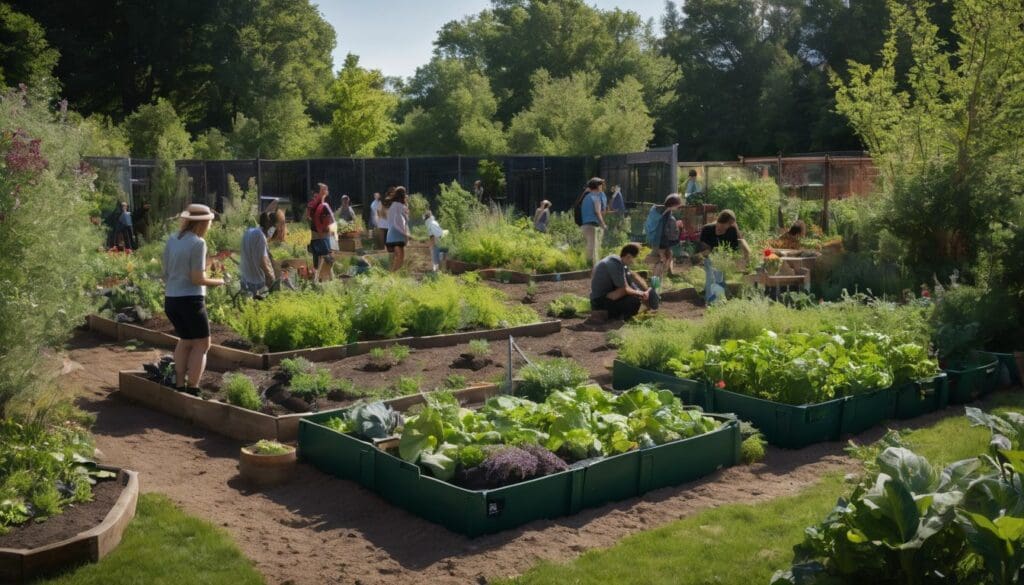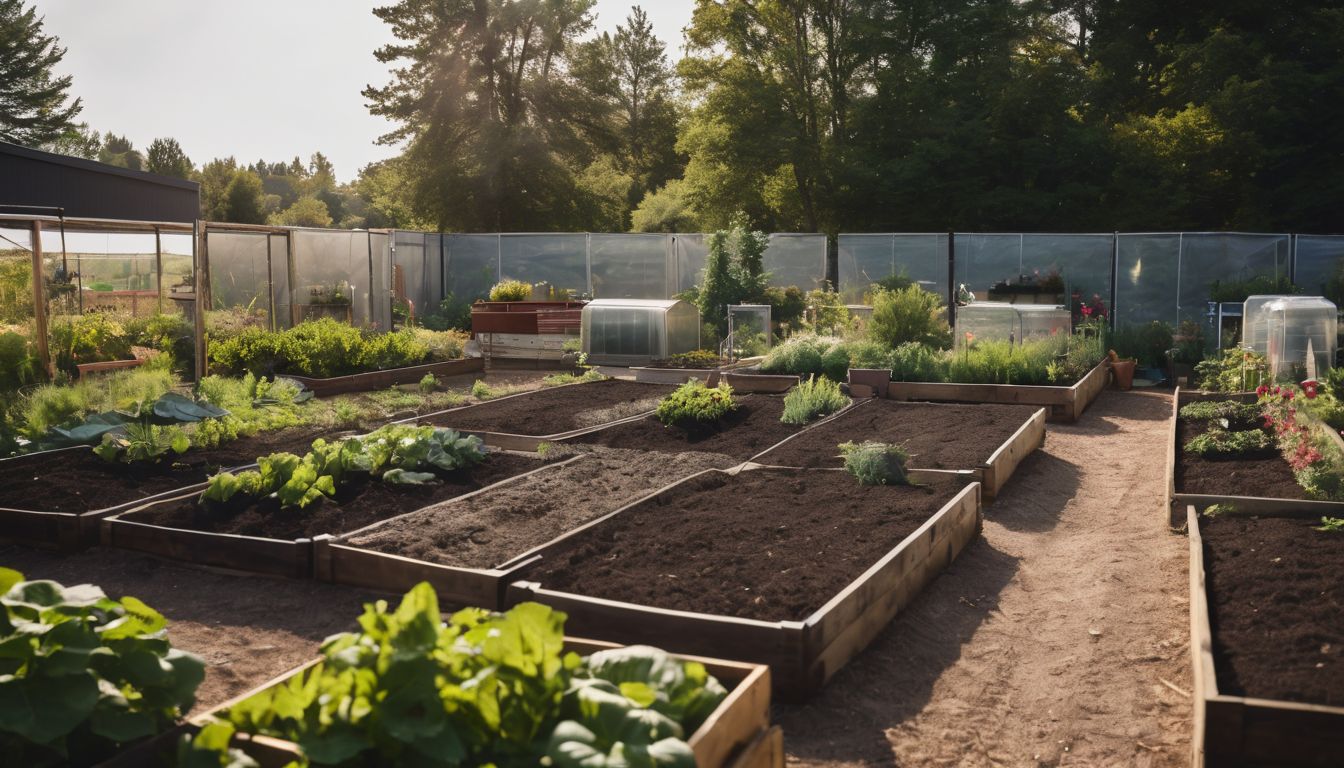Organising a community event with an eye towards sustainability can, at times, feel like scaling a mountain. We’ve embraced this challenge wholeheartedly, buoyed by the knowledge that in 2021, more than seven out of ten consumers expected businesses to step up their game in green practices.
Our thorough research has uncovered practical strategies for crafting an eco-fair that’s not only environmentally conscious but brimming with vitality and charm. This article will be your companion in orchestrating a Community Eco-Fair where enjoyment and ecological stewardship go hand in hand.
Let’s join forces to make our world a better place!
Key Takeaways
- Plan a sustainable community eco-fair by focusing on green practices, such as partnering with eco-friendly venues and offering transportation options that reduce carbon emissions.
- Create an effective waste management programme at the fair to include recycling, composting, and responsible disposal of organic and electronic waste with strategically placed bins and informed volunteers.
- Promote your eco – fair through creative advertising across social media platforms, engaging handouts and local collaborations to attract attendees committed to environmental stewardship.
What is a Sustainable Community Eco-Fair?
A Sustainable Community Eco-Fair brings together local vendors, environmental activists, and the general public to celebrate and promote sustainable living. We showcase eco-friendly products, share information about conservation efforts, and inspire attendees with earth-friendly practices.
At this event, everything revolves around reducing our carbon footprint and enhancing environmental awareness within the community.
We create a space where like-minded individuals can engage in meaningful conversations about green sustainability fair ideas while enjoying activities that emphasise the importance of an environmentally friendly lifestyle.
Sustainable event vendors offer their goods, demonstrative recycling initiatives are highlighted, and renewable energy solutions take centre stage. This is more than just a fair; it’s an experience that encourages each of us to become eco-conscious participants in shaping a greener future.
Planning for a Greener Eco-Fair
When organising a community eco-fair, it’s important to make sustainability a priority. This involves partnering with eco-friendly event venues, sharing eco-friendly messaging with attendees, and providing sustainable transport options.
Making sustainability a priority
Sustainability is at the heart of our eco-fair planning. We prioritise eco-friendly practices that minimise environmental impact. Our commitment to sustainable event ideas guides us in partnering with green venues, spreading eco-conscious messaging, and offering sustainable transport options.
By incorporating these strategies, we aim to inspire and engage environmentally conscious individuals who value conservation efforts.
Our emphasis on sustainability extends beyond the event itself; it is a guiding principle from start to finish. In doing so, we hope to provide an immersive experience that showcases the benefits of environmentally friendly practices while promoting responsible stewardship of the planet.
Partnering with eco-friendly event venues
When organising a Community Eco-Fair, we prioritise partnering with eco-friendly event venues. This includes selecting locations that align with our sustainable values and have environmentally conscious practices in place.
By choosing such venues, we contribute to the overall eco-friendly atmosphere of the fair and showcase our commitment to sustainable event planning. Additionally, collaborating with these venues allows us to tap into their expertise in green initiatives and maximise our impact on the environment through every aspect of the event.
To create an impactful Community Eco-Fair, it’s essential to secure partnerships with eco-conscious event venues. Embracing this approach not only enhances the overall sustainability of our fair but also encourages others to adopt environmentally friendly practices in their own events or daily lives.
Sharing eco-friendly messaging with attendees
To promote sustainability, we share eco-friendly messages with attendees. We engage attendees through interactive displays that educate and inspire. This includes informative signage about sustainable practices and eco-friendly initiatives. We also promote the use of reusable items such as water bottles and bags, reducing single-use plastics. Upon entering the fair, attendees receive informative leaflets detailing the environmental impact of their choices and encouraging eco-conscious decisions. Additionally, we have information booths where attendees can learn about local environmental issues and sign up for volunteering opportunities with conservation organisations at the event. Our aim is to empower attendees to make more environmentally friendly choices in their daily lives.
Providing sustainable transport options
- Organising shuttle services from public transport hubs, reducing individual car usage.
- Encouraging attendees to carpool through social media campaigns and incentives.
- Collaborating with local bike – sharing schemes for a greener alternative to driving.
- Setting up designated parking areas for electric and hybrid vehicles.
- Partnering with eco – friendly transportation companies for event travel needs.
Creating a Waste Management Programme
To ensure a greener eco-fair, creating a waste management programme is essential. This includes collecting multiple streams at one station, engaging volunteers and effectively placing recycling bins.
Collecting multiple streams at one station
When organising a Community Eco-Fair, we prioritise collecting multiple streams at one station to streamline waste management and recycling efforts. This enables attendees to dispose of different types of waste efficiently, reducing the overall impact on the environment. Here are some key aspects to consider when implementing this approach:
- Categorise waste into separate bins for paper, plastic, glass, and metal to facilitate recycling.
- Provide clear signage and instructions for proper disposal of each type of waste to avoid contamination.
- Offer composting options for organic waste to minimise landfill contributions and promote sustainable practices.
- Train volunteers to assist attendees in sorting their waste correctly, ensuring that recyclables are not discarded as general waste.
- Continuously monitor and empty collection bins throughout the event to prevent overflow and maintain a clean environment.
- Implement measures to reduce single – use items by encouraging reusable alternatives at the waste collection point.
- Collaborate with local recycling centres or organisations for proper disposal or repurposing of collected materials after the event.
- Use recyclable or biodegradable materials for waste collection containers as part of our commitment to sustainability.
Including organic waste
At our Community Eco-Fair, we make sure to include the management of organic waste as part of our comprehensive waste management programme. By setting up designated stations for organic waste collection, we aim to divert this biodegradable matter from landfills and promote composting.
Our volunteers are trained to assist attendees in sorting their waste appropriately into different streams, emphasising the importance of reducing food waste and returning nutrients to the soil through composting.
Furthermore, by including organic waste in our sustainability efforts, we strive to encourage environmentally friendly practices and raise awareness about the impact of food waste on our planet.
Placing recycling bins effectively
To ensure effective waste management at our Eco-Fair, we position recycling bins strategically throughout the venue. We place clearly labelled recycling stations next to every trash can to encourage attendees to separate their waste correctly.
By placing these bins in high-traffic areas and near food and drink vendors, we make it convenient for visitors to dispose of their recyclables responsibly.
Additionally, we position larger recycling stations with multiple compartments in central locations, allowing attendees to easily sort their waste into different streams. This method increases the likelihood of proper recycling and helps reduce contamination.
Engaging volunteers stationed by the bins also educates attendees on what items go where, further improving our event’s waste diversion efforts.
Engaging volunteers
When attendees actively participate in waste management, the success of our eco-fair increases. Here’s how you can engage volunteers effectively:
- Assign specific roles and responsibilities to each volunteer, such as manning recycling stations or guiding visitors on sustainable practices.
- Offer incentives for volunteering, like free entry to workshops or eco-friendly product vouchers.
- Incorporate fun activities for volunteers, such as eco-themed competitions or recognition awards for outstanding contribution.
- Provide training sessions to educate volunteers on waste sorting techniques and eco-friendly messaging delivery.
Promoting Your Eco-Fair
Spread the word about your eco-fair through creative advertising, social media engagement, and gathering feedback from attendees. Want to learn more about how you can effectively promote your environmentally friendly event? Read on for some helpful tips!
Advertising ideas
- Utilise social media platforms such as Facebook, Instagram, and Twitter to create engaging posts about the event. We can share teasers, behind-the-scenes glimpses, and updates using relevant hashtags like #GreenFair and #SustainableEvent.
- Design eye-catching posters and flyers that highlight the key attractions of the Eco-Fair, emphasising its eco-friendly initiatives and activities.
- Collaborate with local businesses and organisations to cross-promote the event through their newsletters, websites, or storefront displays.
- Engage with local press by crafting press releases or reaching out to environmental bloggers/journalists for potential coverage of the Eco-Fair.
- Host a launch event or workshop as a prelude to the Eco-Fair, inviting influencers or community leaders to amplify awareness about the event.
Utilising social media and handouts
- Posting engaging content on platforms like Facebook, Instagram, and Twitter to create a buzz and awareness.
- Sharing behind-the-scenes videos and interviews with vendors to showcase the eco-friendly products available.
- Creating eye – catching flyers and leaflets with event details and spreading them at local businesses, community centres, and farmers’ markets.
Gathering feedback and following up
After each community eco-fair, we seek feedback to improve future events and assess impact. We utilise feedback forms and surveys to gather valuable insights from attendees, volunteers, and vendors. Additionally, we follow up through email or phone calls to express gratitude and encourage ongoing engagement.
- Distribute electronic and paper feedback forms at the event for attendees to share their thoughts on activities, workshops, and overall experience.
- Send out online surveys with questions about the eco – fair’s effectiveness in promoting sustainable practices and any suggestions for improvement.
- Contact vendors and exhibitors post – event to gather feedback on their experience, areas of success, and areas needing improvement for future participation.
- Reach out to volunteers for input on their roles during the fair, their experiences, and any ideas for enhancing volunteer engagement in subsequent events.
- Analyse all gathered feedback to identify key themes or areas requiring attention or improvement for future eco-fairs.
- Share a summary of the feedback with stakeholders such as sponsors, local authorities, and relevant environmental organisations to demonstrate our commitment to continuous improvement.
Conclusion
Let’s commit to planning a greener future by organising more sustainable community eco-fairs. We can prioritise sustainability, partner with eco-friendly venues, and share eco-conscious messaging with attendees.
By creating effective waste management programmes and promoting our fairs through sustainable advertising ideas, we can make a positive environmental impact. Our efforts will inspire and engage environmentally conscious individuals in supporting conservation and environmental practices.
FAQs
1. What is a Community Eco-Fair?
A Community Eco-Fair is an environmental event that promotes ecofriendly products, green fair activities, and earth-friendly practices within the community.
2. How do you organise an ecoconscious event like a Green Fair?
Organising a Green Event involves planning activities that encourage sustainability, finding ecofriendly travel options for attendees, and working with green event planning companies to ensure everything is environmentally responsible.
3. Can sustainable conference strategies be applied to organising an Eco-Fair?
Yes! Implementing sustainable conference strategies ensures your Eco-Friendly Event includes activities and practices that minimise waste and use resources efficiently.
4. Where can I find ideas for ecofriendly event activities?
Ecofriendly event planning often includes creative ideas such as workshops on recycling or showcasing local green initiatives which you can source from other successful environmental events or specialised planners in this field.
5. Is it important to consider ecofriendly travel options for participants of the fair?
Absolutely! Encouraging attendees to use eco-friendly travel options helps reduce the carbon footprint of your Green Event and aligns with its mission of promoting sustainability.





